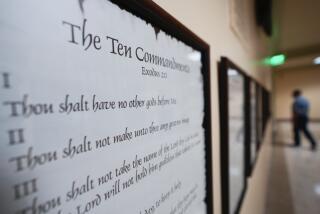11th Commandment: Thou Shalt Respect Other Faiths
- Share via
The Triple Celebration on Dec. 7 of Hanukkah, Advent and the end of Ramadan at the Church of Jesus Christ of Latter-Day Saints in Newport Beach was a refreshing moment in a world racked by religious hatreds wrapped in geopolitical grievances. Jews, Christians and Muslims prayed, sang and ate together, even as the God of all three faiths was weeping over the global bigotry and violence that pit religionists against one another in so many places. Some examples:
* A few prominent evangelical Christians recently hurled false and hurtful epithets against Islam’s founder, Muhammad.
* Egyptian television just finished airing a 41-part series, “Horseman Without a Horse,” based in part on the “Protocols of the Elders of Zion,” a completely debunked 1890s canard claiming that Jews have a master plan to take control of the world.
* Two years ago the Taliban, the Islamic zealots then ruling Afghanistan, blew up a pair of magnificent rock statues of the Buddha at Bamian.
* Christians have been attacked several times in the past year in Pakistan; anti-Semitism has returned with a vengeance to Europe, especially France.
Add to these abuses the current persecution of Sudanese Christians and animists by that nation’s Islamist government, and China’s long suppression of Tibetan religion and, more recently, of evangelical Christians and the Falun Gong movement. These are tragic situations with echoes of the Crusades, the Inquisition, the Armenian and Bosnian genocides, and the Holocaust -- to name just a few of the evils wreaked upon one religious tradition by another.
What might be done to stem this torrent of inter-religious abuse? Here is an 11th commandment that the adherents of all religions ought to consider: Do not speak or act with malice toward another’s religion. The commandment does not rule out reasoned criticism of the actions of followers of other faiths. When one religious group terrorizes another, when clergy abuse children sexually, or when TV preachers dupe senior citizens with bogus appeals for funds, the media, society at large and other people of faith need to speak out.
The commandment is buttressed by the Golden Rule, which in one form or another is common to all religions. If you’re going to criticize the belief or practice of another faith, do it with charity and a consciousness of how you would like to be critiqued. Put differently, speak about somebody else’s religion only in the way you would if he or she were present.
In the third century BC, the great Indian philosopher-king Ashoka, a convert to Buddhism who spread his new faith to Sri Lanka and elsewhere, said, “The religious persuasion of others should be respected in every way,” adding, “Let all listen to one another’s dharma [teaching].”
The Koran, so often maligned as a war-mongering scripture, also puts it well: “And do not dispute with the People of the Book [Jews and Christians] except in the best way, unless it be with those of them who do wrong [presumably, those who persecute Muslims].”
A principal reason that an event such as the Triple Celebration could happen in the shadow of Sept. 11 and the war on terrorism is the First Amendment’s guarantee of religious freedom. We live in a land where no one faith is privileged, where all can compete equally for followers in the free marketplace of religious ideas. That competition has largely been fair and uninhibited and has benefited the various religions and the nation. Jews, Catholics, Protestants, Muslims, Buddhists and other faith communities all have charitable organizations that aid the poor and suffering both here and abroad. It is a holy vying for souls that might not have been so vigorous without the shared knowledge that the other major religions were also seeking to care for the less fortunate.
One of the nastiest violations of the 11th commandment is intra-religious bigotry. James Madison was moved to fight for religious freedom in Virginia and then the nation as a whole by the scene of an Anglican clergyman horsewhipping a Baptist for preaching in his home state. There has been a remarkable period of cooperation and respect among Christians since the 1960s, but the work is not complete; the same is true of intra-Jewish relations.
Members of various faiths obviously disagree on matters of religious truth, and the 11th commandment does not negate public discussion of theological differences. What it does rule out is stereotyping, sweeping generalizations and half-truths. The antidote to such prejudice is unbiased study of other faiths and dialogue with their adherents. If the world’s faithful viewed an attack on any religion as an attack on their religion, how much more peaceful the planet might be.
More to Read
Sign up for Essential California
The most important California stories and recommendations in your inbox every morning.
You may occasionally receive promotional content from the Los Angeles Times.













